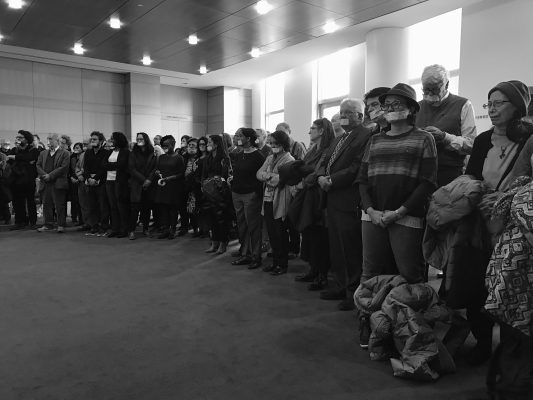Faculty Look Forward After Protest
Faculty Senate has been protesting the administration’s decision to determine faculty pay increase without negotiation. (PHOTO BY SOPHIE KOZUB/THE OBSERVER)
February 24, 2017
After members of the Fordham Faculty Senate held a silent protest outside of a Continuous University Strategic Planning (CUSP) meeting on Feb. 2, faculty members are still working to reach an agreement with the university administration.
The protest was the result of a series of disagreements over the university’s decision to determine the amount of annual faculty pay increase without the approval of the Faculty Senate, as well as whether the Faculty Hearing Committee was able to hear and rule on grievances filed against the administration.
Anne Fernald, Ph.D, President of the Faculty Senate and English Professor, filed grievances against three administrators and the Board of Trustees in September, saying that the administration decided on the amount that would be spent on a pay increase for the faculty without the involvement or approval of the Faculty Senate.
The Faculty Hearing Committee determined that the Board of Trustees and the Administration had violated University Statutes by not making a final decision with the Faculty Senate, but the administration countered that the Hearing Committee did not have the power to make decisions on the grievances.
Among the ongoing disagreements is the issue of health insurance for faculty and staff members. Andrew Clark, chair of the Faculty Salary and Benefits Committee, says that the administration is attempting to remove an “enhanced” healthcare plan that the faculty had already negotiated on for the past several years.
According to Clark, over 150 faculty members participated in the protest, wearing pins, flowers, and tape over their mouths while they stood in silence. Clark said that the faculty wanted to give a “silent indication” of “in a respectful way” that showed their “frustration” and “discontent” with the Board of Trustees.
“Being there was also to remind the board that we have not forgotten them,” Clark said. “The symbolic tape on the mouth was that our silence was an imposed silence.”
Clark says that there have not been any reactions or changes from administration since the protest, but that Stephen Freedman, the Provost of Fordham University, “acknowledged their presence” and that it was a “nice gesture.” He also said that a positive response has come from faculty members and the Fordham community.
In response to University Counsel Elaine Crosson’s comment that the Committee “had no authority to act upon the grievances,” Clark said that the response was not “surprising.”
“I think what was unfortunate and not surprising is the way we became invisible for pretty much every single person who walked into that room,” Clark said.
Clark said that they will be continuing to work with administration, and that their main concerns are about pay cuts and the changing of health care plans, as it significantly affects the lives of many faculty.
“We’re willing to sit at the table and try to find productive ways of saving money, but that don’t penalize people,” Clark said.













